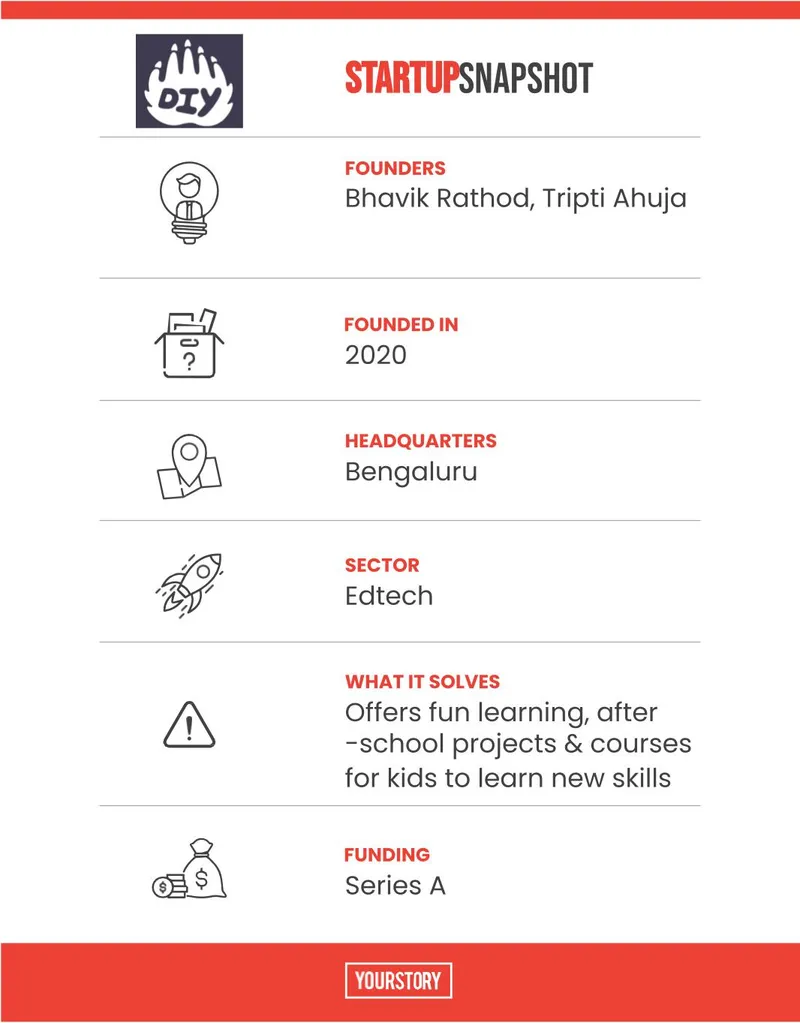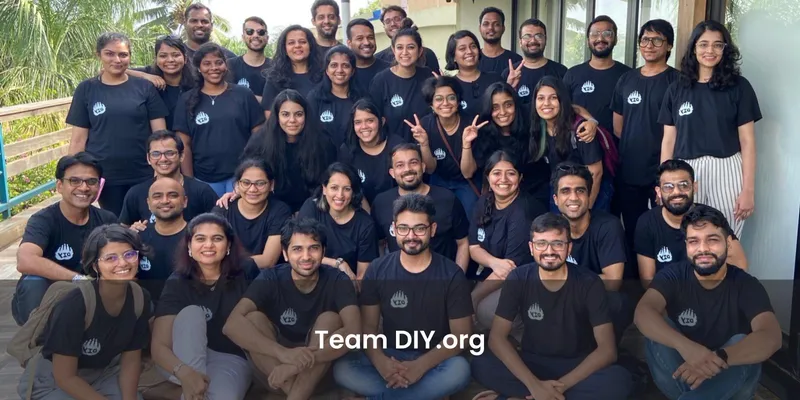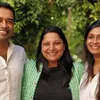[Tech50] This startup has created a unique social media platform for kids to share their after-school learnings
Bengaluru-based edtech platform DIY.org, a YourStory Tech 50 startup for 2021, follows a unique project-based learning approach where kids are encouraged to choose a skill, perform an activity, and share their creations with fellow learners
Parents to a six-year-old daughter, Bhavik Rathod and Tripti Ahuja were baffled by how quickly their child adopted online learning during the coronavirus pandemic induced lockdown. As parents, it fundamentally made them believe that the future of education is going to be hybrid.
This was their first cue to bring an idea they had been incubating for long, back to the table. The plan was not to build a routine edtech platform focussing on the regular curriculum but to step outside the schools and stimulate the “right brain of a child”.
The couple knew that there lies a "massive opportunity" in ‘after-school learning’. With everything going digital, they wanted to bring extra-curriculum activities online but at the same time not compromise on the practical learning, sharing and fun side of things.
This led to the foundation of the duo’s first venture Kyt Academy, which was eventually rebranded as DIY.org, following the latter’s acquisition. The platform is among YourStory’s Tech50 list of promising early stage startups.
follows a unique project-based learning approach and has built a large library of content, including courses, ‘how-to’ videos and projects, live workshops and contests, for kids to learn and explore new skills.
For instance, after subscribing to the platform, a child can choose to learn gardening where they would be taken through the entire process of growing seedlings, planting an outdoor garden, and making compost, besides other challenges listed on the DIY skill page.
The unique proposition here is the social community factor. Following the projects, children can simultaneously share their work in a moderated community to get peer and mentor feedback, which keeps the learning momentum going.

Holistic learning
Bhavik and Tripti started exploring the space in the early 2020s and began by understanding the problem from the parents’ perspective.
“We spoke with parents across the globe and found that nine out of 10 parents were looking for opportunities that they could engage their kids in after school to help them learn new skills. However, they were very confined in their access to such activities outside the school curriculum,” says Bhavik, who was the founding leader for Uber India and former head of Uber Eats, India and South Asia.
Tripti, on the other hand, built a career in marketing, branding, and consumer insights and has earlier worked with organisations such as Rizort, Comet Global Consulting, Covalent Marketing, Sapient and Customer Centrica. She previously founded online exhibition platform exibit.in (which shut shops in 2016), and has also co-founded e-commerce platform 400 THINGS.
Exploring the whitespace, the couple birthed their first venture— Kyt Technologies, an edtech platform offering extracurricular courses for children between five and 16 years of age. The courses were a combination of live classes with video-based revision material curated by experts ranging from dance, chess, creative writing, musical instruments, yoga and public speaking.
“The idea was to create a platform that will offer life-skills pedagogy and a project-based learning platform built in India for the world. There are very few edtech companies, especially in India, which are helping kids learn new skills after school. We thought why not pick up this problem statement and solve this for our own daughter.”
By September 2020, the official website was launched by the name Kyt Academy.
Within a month of its launch, the Bengaluru-based startup managed to create a buzz in the market and piqued investors’ interest. It went on to raise its seed round of $2 million (Rs 14.5 crore), led by Sequoia Capital India’s Surge followed by a capital infusion of $5 million (Rs 36.5 crore) in a Series A funding round in January 2021, led by Alpha Wave Incubation by Falcon Edge Capital and participation from January Capital, Titan Capital, angel investors Kunal Shah, Amrish Rau, Jiten Gupta, Anand Chandrasekharan, among others.
In Feb 2021, Kyt Technologies acquired San Francisco-based project-based learning platform DIY.org (founded by Vimeo creator Zach Klien) and merged the operations of the two companies. With the acquisition, Kyt Academy was rebranded into ‘DIY- A Learning Community’ and relaunched in May 2021.

Learning-by-doing
The platform follows a ‘learning by doing’ approach and terms itself as a “social media platform for kids to share those learnings”.
Each project follows a three-step approach — watch the video, perform the activity (as guided) and share your creation on DIY with fellow learners to interact and earn experience points (to incentivise and encourage kids to do better) for the skills they pick up.
These videos are “completely unfiltered” and narrated by children themselves. They can be seen taking the viewers through their garden patches, explaining the value of compost, how to develop a compost pile, how composting works, and how they will use it in their garden and many such similar examples.
“It is both heartwarming and exciting to see the comments section filled with children and parents inspiring each other over small little projects,” says Bhavin, who aspires to make DIY the world’s largest online community of kids learning together. The startup uses feedback from parents and children to design new courses or make changes to existing ones.
The platform offers over 32 courses including chess, drawing, language reading, science lessons, and 3,700+ projects/challenges, across more than 160 life skills such as critical thinking, communication skills, decision-making and social skills.
It conducts about 20-30 live workshops every day led by expert mentors and instructors. It has recently launched TV shows like Fun Fact Factory, DIY X CartoonNetwork, Outsiders Club, Pets Paradise and Busy Bodies on its YouTube Channel.
The startup has partnered with various educators and artists, including yoga instructor Sabrina Merchant and Filipino hip-hop artist Ruel Varindani and chess Grandmaster Vidit Gujrathi, to create courses with an age-appropriate approach.
“We add one or two courses every week. Everything on our platform is designed to inspire the child to go outside and take up a project and do the activity themselves,” says Bhavik.
Privacy is carefully protected, the startup assures. There are no advertisements on the platform, which is Children's Online Privacy Protection Rule (COPPA) compliant. It is extremely controlled to keep it appropriate for kids and avoid bullying.
Revenue & traction
The platform follows a subscription-based business model. It offers a 30-day free trial before subscribing to either a monthly or yearly plan of $7.99 (around Rs 600) and $79.99 (around Rs 6000), respectively. Each parent can add up to four kids in the same plan.
As per the founders, 45 percent of its users opt for the yearly subscription and 67 percent of its paid customers come from North America followed by Asia and Europe.
Standing at a valuation of $25 million with an annual recurring revenue (ARR) of 0.8, DIY has amassed over 14,400 clients from across 160+ countries. It has doubled its subscribers since August 2021, say the founders.
It faces direct competition from US-based edutech platform Outschool and Tract.app. In India, the market is picking up with startups like QShala and Frontrow building their platforms around extra-curricular learning activities.
The road ahead
DIY is working with a long term goal of reaching a subscriber base of 5 million kids globally and touching an ARR of $200 million. The platform is currently available in English and will soon introduce other languages in the near future.
“By 2022 end, we plan to touch its ARR to $4 million with a subscriber base of 100K kids globally,” says Bhavik.
DIY is seeing an increased traction from developing countries, especially India. “The Indian market is growing very rapidly. We do conduct some of our live classes in India. But at present, we are maintaining a global play, which is also our strength,” he adds.
The market size for co-curricular and extra-curricular learning in the US alone is estimated to touch $23.4 billion in 2021, according to research consultancy IBISWorld. The increased penetration of smartphones and the internet has also led to rise in its adoption across developing countries, including India which is projected to reach $5.8 billion in 2021 and set to rise in the coming years, reveals a study by IIM-Kozhikode students.
The startup has witnessed good organic growth in the last few months and is continuously working on adding new projects, courses and content to keep the engagement level high.
Its neat domain name can be a moat that can increase their brand and lower their customer acquisition cost and grow quickly. Also, there is a lack of practical learning in the current teaching pedagogy and there is an improved perception amongst parents for online options and looking to explore beyond Youtube channels and find more engagement platforms.
Edited by Ramarko Sengupta


![[Tech50] This startup has created a unique social media platform for kids to share their after-school learnings](https://images.yourstory.com/cs/2/628912e0d7f211eb8e8307e5b6451cf7/DIYIMAGEUPDATED-1639720386207.jpg?mode=crop&crop=faces&ar=2%3A1&format=auto&w=1920&q=75)


